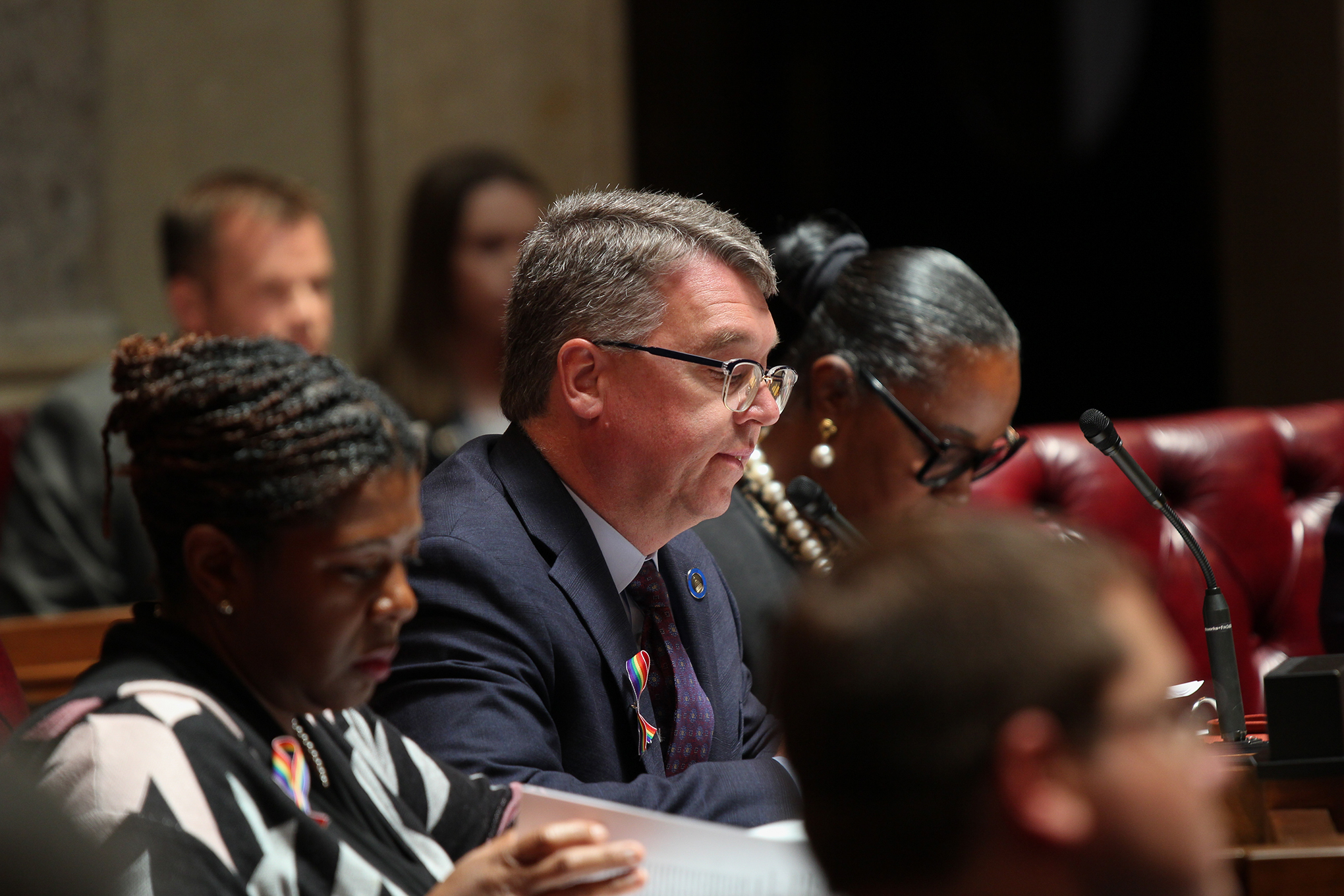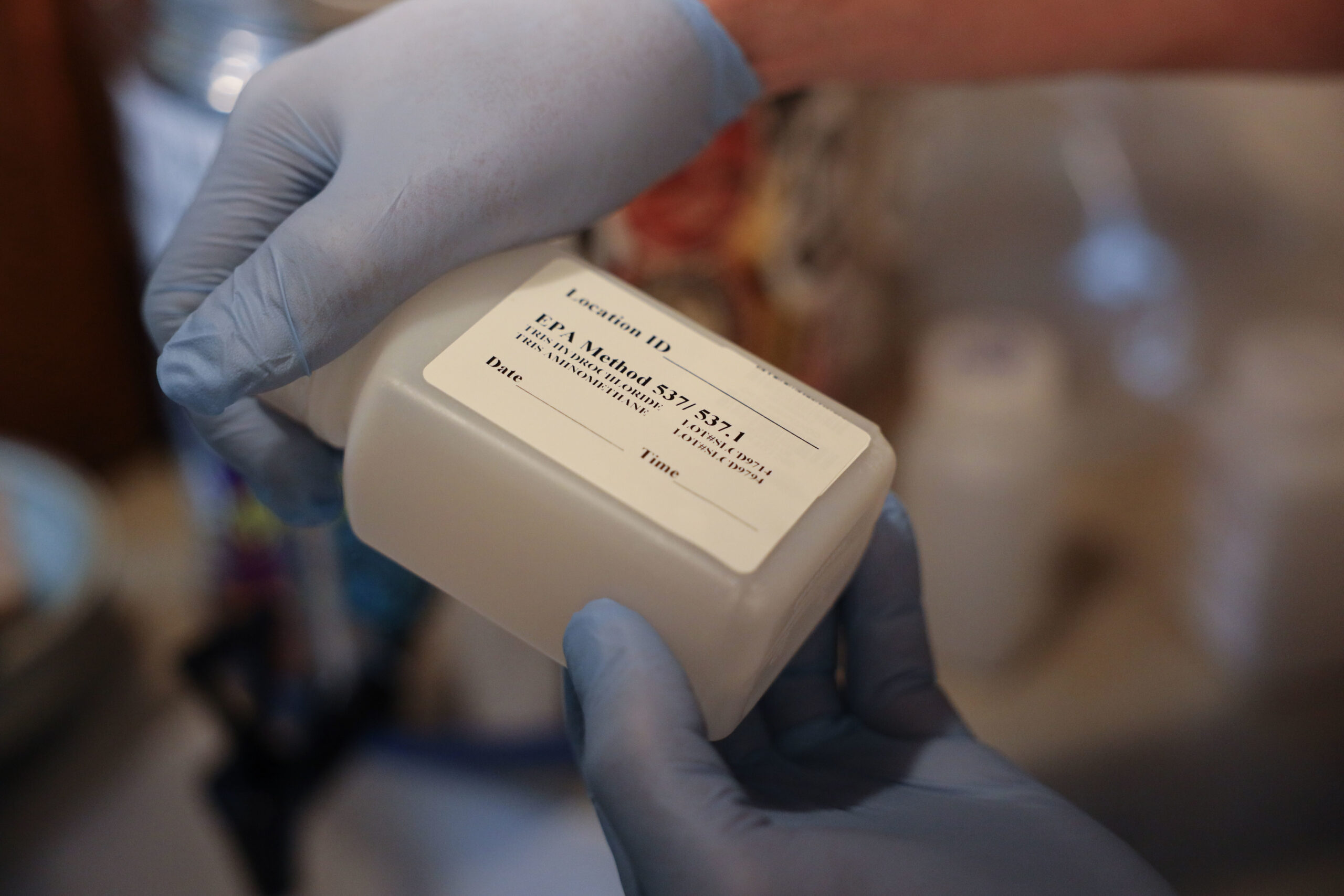GOP lawmakers are introducing a bill that aims to restart the process for setting standards for toxic forever chemicals in groundwater after state environmental regulators were forced to abandon regulations late last year.
The legislation introduced by Green Bay Republican Sens. Eric Wimberger and Rob Cowles would let the Wisconsin Department of Natural Resources move forward with groundwater standards for PFAS, short for per- and polyfluoroalkyl substances.
PFAS are a class of thousands of synthetic chemicals used in cookware, food wrappers and firefighting foam. They don’t break down easily in the environment. High exposure to the chemicals has been linked to kidney and testicular cancers, fertility issues and other serious health problems.
Stay informed on the latest news
Sign up for WPR’s email newsletter.
“The costs of the groundwater standards could be significant. However, the benefits are substantial by finally stopping the spreading of biosolids contaminated by PFAS which leads to rural property values tanking and the potential for millions in remedial costs down the line,” the lawmakers wrote in a memo seeking co-sponsors for the bill.
“Additional benefits come from reduced or avoided health implications from the consumption of high levels of PFAS. Those financial costs and benefits were recognized nearly six years ago when this rulemaking process began, and remain true today.”

DNR forced to abandon groundwater regulations for PFAS
In December, the DNR abandoned its second attempt at proposed regulations for the chemicals in groundwater due to a 2017 law aimed at preventing excessive administrative costs.
That law, known as the REINS Act, prevents agencies from working on regulations without legislative approval if the cost to implement them goes beyond $10 million in any two-year period. An economic analysis found it would cost more than triple that threshold to place limits on the chemicals for groundwater.
Cowles told WPR it makes sense to have a science-based standard for groundwater.
“I’d argue if we could come up with a fair one at 70 parts (per trillion) for drinking water, why not use the same standard for groundwater,” Cowles said.
The state enacted a PFAS standard of 70 parts per trillion in drinking water for two of the most widely studied chemicals — PFOA and PFOS — in August 2022. Since then, the EPA has proposed a more stringent national standard of 4 parts-per-trillion for the two substances, as well as regulating a mix of four other chemicals. The federal agency has yet to finalize limits in drinking water.
PFAS standards are lacking for nearly a third of state residents who rely on private wells that draw from groundwater. Communities across the state are facing PFAS contamination in private wells, including the town of Campbell near La Crosse and town of Peshtigo in northeastern Wisconsin.
The Republican bill doesn’t provide an exemption to the REINS Act, which Gov. Tony Evers urged lawmakers to pursue. Democrats introduced legislation this month that would provide a one-time exemption to the law.
Sen. Brad Pfaff, D-Onalaska, said he’s disappointed with the Republican proposal.
“All it does is it allows the Department of Natural Resources to continue to move forward, but there’s no guarantee that there’ll be any type of implementation, that we can move forward and remove this PFAS,” Pfaff said.
Cowles argued the bill put forward by Democrats is too vast because it includes all PFAS chemicals. The Republican legislation would be limited to the DNR’s proposed regulations for four PFAS substances.

DNR proposed limits based on health recommendations
The DNR had suggested groundwater limits based on recommendations from state health officials, which are more stringent than Wisconsin’s drinking water standards for the chemicals.
For PFOA and PFOS, the DNR is recommending standards of 20 part per trillion. The agency is also recommending standards of 300 parts per trillion for GenX and 450 parts per billion for PFBS.
Without standards, Evers has said another PFAS bill isn’t feasible. Meanwhile, Republicans argue they’re not mutually exclusive.
Last year, GOP lawmakers introduced a separate proposal that creates a plan for spending $125 million set aside in a trust fund under the 2023-2025 state budget. It would provide grants for local governments and landowners to address PFAS contamination. More than six months later, those funds have yet to be spent. The governor and Democrats argue the bill weakens the DNR’s authority and protects polluters.
Evers has since called on Republicans to release those funds, accusing them of playing politics with people’s water. Cowles said GOP lawmakers feel they’ve worked in good faith with the governor and the DNR on legislation that would help communities address PFAS pollution.
A bill that would spend the $125 million passed the Senate last year and is expected to get a vote before the state Assembly later this week. Cowles said he expects it to pass, but Evers has indicated he may veto the plan.

PFAS proposals come as time is running out on legislative session
Both Cowles and Pfaff agree time is running out for both bills with the end of the legislative session drawing near.
Cowles said he hopes Evers signs their bill to address PFAS contamination and get grants to struggling communities and landowners.
“It’s the right thing to do,” Cowles said. “In a split (government) situation, you simply don’t get everything you want.”
He said he also hopes the groundwater bill will pass, adding it would likely be brought back if it fails this session.
Pfaff said he remains hopeful that a compromise may be reached on both bills. He said it’s long past time for legislators to address PFAS in groundwater and help communities who are struggling.
“Too many residents in the Town of Campbell through no fault of their own for the last three-plus years have not been able to go to their faucet and turn on the tap and drink that water. I just think that’s wrong,” Pfaff said. “I just don’t understand how a political process can be so paralyzed.”
Wisconsin Public Radio, © Copyright 2025, Board of Regents of the University of Wisconsin System and Wisconsin Educational Communications Board.




